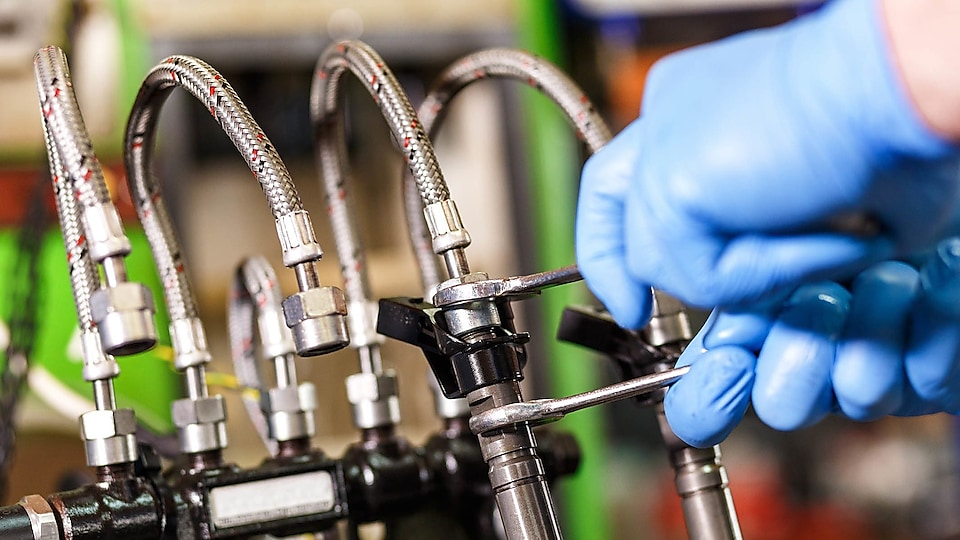
Injection Systems, Fuel Performance and Machine Failure: The Hidden Connection
Whether cutting operating costs and downtime, or increasing a company’s efficiency and profitability does not always require large-scale changes. Construction managers can make a big bottom-line impact by also paying more attention to the smallest components in the heart of their vehicles such as the fuel injection system.
By Elitza Terzova, Global Fuels Product Manager of Shell Commercial Fuels on Jul 07, 2019
Construction companies can significantly save on maintenance and other costs by switching to a high performing fuel Often, when we’re looking for ways to cut operating costs and downtime, or increase the company’s efficiency and profitability, we think of large-scale changes: the adoption of fleet-wide telematics, the move to next-generation equipment or other major investments. What’s sometimes overlooked, is the big bottom-line impact managers can make by paying more attention to the smallest components in the heart of their vehicles: a good example being the fuel injection system.
A fuel injector is an electronically controlled valve. Supplied with fuel by the vehicle’s fuel pump, the injector pressurises the fuel and sprays it as a fine mist, mixed with air, into the cylinder, which is then heated up by the piston stroke. The high temperature causes the fuel to ignite, powering the engine.
When injectors get clogged or corroded, the whole engine runs at suboptimum efficiency and could even malfunction. According to one study, the presence of corrosion deposits reduced the injection quantity by 26% 1. This cuts the amount of energy that is transmitted to the wheels and increases fuel consumption.
Fuel injectors in modern engines are more efficient than ever. One recently developed injector claims to offer a 15% improvement in fuel efficiency over older injector systems 2. But the more efficient injectors are, the more it matters that they be kept in good condition in order to deliver the engine performance they have been designed for.
So how can construction-site and equipment managers make the most of their fuel injectors and engines in order to increase equipment utilisation and overall site efficiency?
Using advanced fuels with active deposit control additives is the foundation on which to build modern, efficient and competitive construction operations.
The construction site is a harsh environment for fuel injectors
For an engine, a construction site is a tough place to be. One study of road construction sites found 25% more dust and particulates in the air than were present before work began 3. Equipment such as excavators, trucks and cranes are often in operation for long hours in harsh conditions. In contrast with vehicles in other sectors, there’s no regular return to an indoor depot for a strip down and maintenance.
This makes it more important than ever that the operating conditions for construction equipment — including ongoing maintenance, fuel type and lubrication — are suitably optimised to enable reliable performance of injectors and engines. Furthermore, though the age and standard of engine technologies vary globally, the industry has experienced a general level of advancement in the sophistication and intricacy of engine components. While these systems undoubtedly have a higher performance potential, they are also more susceptible to dirt and contaminants. Consequently, they require a greater standard of protection not only to ensure optimum efficiency, but also avoid unplanned and often high costs associated with engine failure, injector replacement, emergency rental of equipment, to name a few.
Taking care of your fuel injectors, therefore, is an investment in fleet and business performance. Clean injectors are less likely to clog or fail. This reduces machine failure and unplanned downtime— particularly important on construction sites, where lost time can hit at company level: disrupted schedules; risk ofcontractual penalties; and blemish on corporate reputation.
With productivity targets in mind, by enhancing spray efficiency, a high-functioning and well-maintained injector system increases the power output of the engine. This helps improve the utilisation and output per unit of equipment, in demanding operations where every hour counts. It also helps reduce fuel consumption, which can further cut operating costs, and also fuel-related CO2 emissions, another increasing focus area for forward-looking companies.

Why the right fuel can make all the difference
No matter if your vehicle is newer or older, when it runs on regular diesel carbon deposits build up over time. Here comes the role of additivated fuels. Fuels with cleaning additives are specially formulated to tackle carbon deposits as well as other contaminants such as particulate matter, corrosion particles, water, and, in the case of biodiesel, also microorganisms. –. The use of fuels containing such cleaning additives can increase the volumetric efficiency of fuel injectors by up to 5% 4.
A good example of the benefits a company can reap by using fuel with high performing additives, as part of an optimised maintenance regime, is the case of Malaysia’s Malbumi Group. One of Malaysia’s leaders in construction, the group switched its fleet of over 300 construction vehicles and 60 stationary generators to Shell FuelSave Diesel with Dynaflex Technology.
The results quickly became clear. “We have never seen injector carbon deposits as light as these, and which you can just wipe off,” said Liew Yun Len, the company’s chief mechanic. Historically, the company used to spend tens of thousands of US dollars a year — and a great deal of time and effort — cleaning, maintaining and replacing fuel injectors.
Since switching to an additivated fuel from Shell, the deposits are so light, they can easily be wiped away, without any need for replacement. “We no longer believe all diesel is the same,“ says Malbumi’s owner, Mr Edward Ang. “Shell FuelSave Diesel with Dynaflex Technology makes a difference for us.”
Advanced additivated fuels, such as Shell FuelSave Diesel with active deposit control technology, are not just designed to prevent build up of carbon deposits. Additionally, they actively clean up such deposits already present in the engine. They may also contain components designed to increase the corrosion protection and dehazing properties of the fuel and mitigate against the corrosive or fuel-aging effective of water that can be introduced during fuel storage.

The foundation of a value-adding fuel choice
Using advanced fuels with active deposit control additives is the foundation on which to build modern, efficient and competitive construction operations. (maintenance regime)
Choosing the right fuel can help construction companies safeguard and make the most of their equipment - from mitigating against the harshness of the environment in which it operates, to increasing its efficiency, reliability and productivity.
All these factors can significantly reduce total cost of ownership and help provide along-standing edge to construction operations both today and in the future. Ultimately, better equipping them to tackle market challenges and remain at the forefront of their industry.
Fuel injector maintenance
As well as using advanced fuels with active deposit control additives, there are also other steps you can take to ensure that fuel injectors operate reliably at optimum performance:
- Ensure that drivers, or those responsible for vehicle maintenance, know when and how injectors should be serviced, as set out by the vehicle manual
- Monitor the engine for signs that injectors may be suffering from deposit build-up — loss of power, black smoke etc. — and take instant action
- If injectors become clogged or malfunction, seek qualified assistance for their cleaning or replacement
- Also get technical advice from fuel experts on proper fuel usage and maintenance practices to help reduce total cost of operations

Footnotes
1. M. I. Karamangila and R. A. Taflan. “Experimental investigation of effect of corrosion on injected fuel quantity and spray geometry in the diesel injection nozzles”, Fuel, Volume 112, 2013, p. 600.
2. The International Institute of Marine Surveying (IIMS). (2019). New diesel injector set to change fuel systems and reduce emissions. Available at
3. Font, A., Baker, T., Mudway, I., Purdie, E., Dunster, C. and Fuller, G. (2019). Degradation in urban air quality from construction activity and increased traffic arising from a road widening scheme. Science Direct. Available at
4. Cooke, E. (2019). ISIS Improving the efficiency of engine fuel delivery – one neutron at a time. Isis.stfc.ac.uk. Available at





